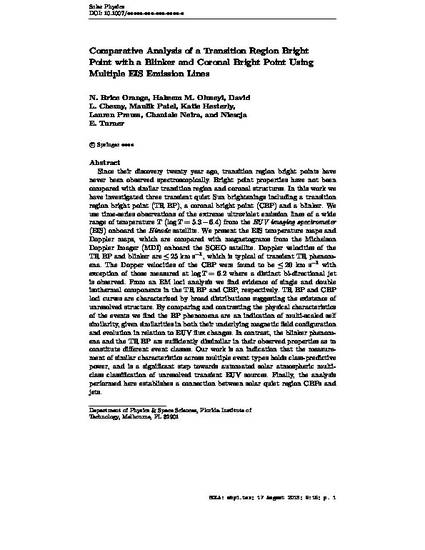
Since their discovery 20 year ago, transition region bright points have never been observed spectroscopically. Bright point properties have not been compared with similar transition region and coronal structures. In this work we have investigated three transient quiet Sun brightenings including a transition region bright point (TR BP), a coronal bright point (CBP) and a blinker. We use time-series observations of the extreme-ultraviolet emission lines of a wide range of temperature T(logT=5.3 – 6.4) from the EUV Imaging Spectrometer (EIS) onboard the Hinode satellite. We present the EIS temperature maps and Doppler maps, which are compared with magnetograms from theMichelson Doppler Imager (MDI) onboard the SOHO satellite. Doppler velocities of the TR BP and blinker are ≤ 25 km s−1, which is typical of transient TR phenomena. The Doppler velocities of the CBP were found to be ≤ 20 km s−1 with exception of those measured at logT=6.2 where a distinct bi-directional jet is observed. From an EM loci analysis we find evidence of single and double isothermal components in the TR BP and CBP, respectively. TR BP and CBP loci curves are characterized by broad distributions suggesting the existence of unresolved structure. By comparing and contrasting the physical characteristics of the events we find that the BP phenomena are an indication of multi-scaled self-similarity, given the similarities in both their underlying magnetic field configuration and evolution in relation to EUV flux changes. In contrast, the blinker phenomena and the TR BP are sufficiently dissimilar in their observed properties as to constitute different event classes. Our work is an indication that the measurement of similar characteristics across multiple event types holds class-predictive power, and is a significant step towards automated solar atmospheric multi-class classification of unresolved transient EUV sources. Finally, the analysis performed here establishes a connection between solar quiet region CBPs and jets.
